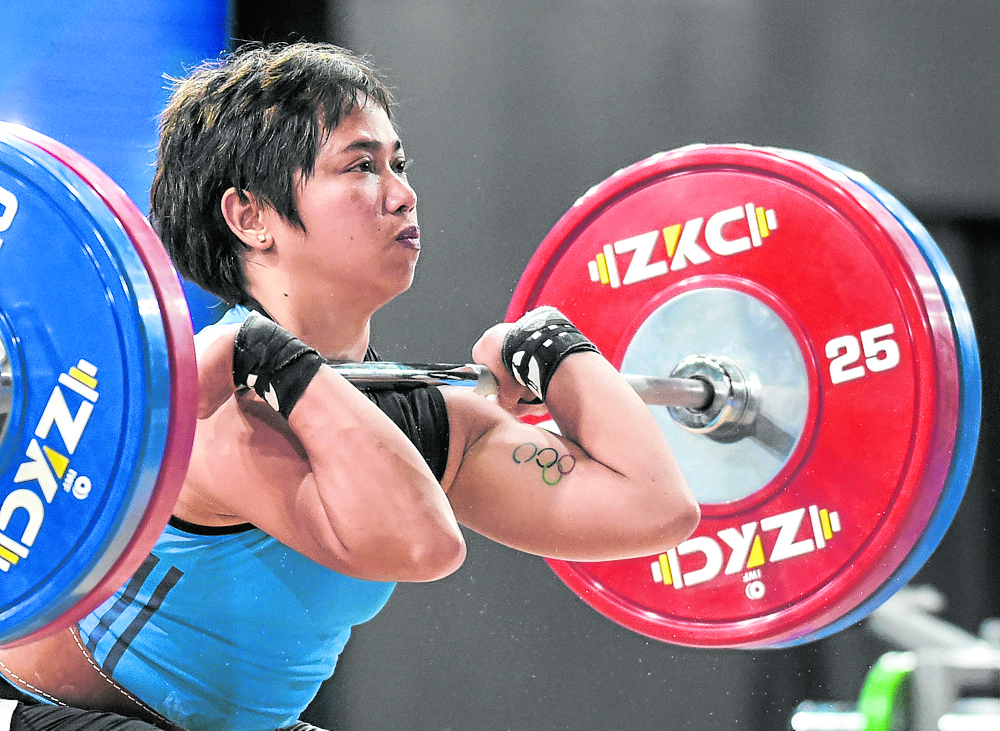
Hidilyn Diaz. INQUIRER FILE PHOTO
Three months leading to his maiden Olympics appearance and touted by many as one of the Philippines’ bright hopes of ending a century-old thirst for a gold medal, Ernest John Obiena feels that this is “the strongest, the fastest I have ever been.”
That’s half of the battle, for he feels that the other half is fought between the ears.
“Mentally, I try to be as strong as I can be,” said Obiena, who will be competing in one of athletics’ centerpiece events in the pole vault.
The reigning Asian champion and Southeast Asian Games king, Obiena is aware of the stiff competition for gold in the Tokyo Games.
And so is Hidilyn Diaz, the weightlifting heroine who faced—and lost to—world-class competition in the Asian Championship in Tashkent that she now has an idea on what her target is and how she can achieve them.
“I like what I saw,” Diaz said in Filipino, referring to the Uzbekistan field. “My timing is OK, my nutrition is OK. But I need to add intensity in my training.”
Top-notch competition
Diaz said she will up the ante of her training: Longer hours, more sessions and better recovery.
For her, it’s all out for the gold medal in Tokyo, for this could be her last—and best shot—at it.
“I’m thirsty for gold,” said Diaz, the Rio de Janeiro 2016 silver winner, as she and Obiena appeared in an online press conference on Friday arranged by Summit Water. “I’m not going to hold back. I’m training to win the gold medal.”
Obiena and Diaz have faced basically the same field they would need to conquer for gold in Japan, as both have not held back in participating in tournaments when given the chance.
Over the past year, Obiena competed against the crème de la crème of the pole vaulting world, including Swede Mondo Duplantis, who owns the world record of 6.18 meters; and defending champion Thiago Silva (6.03m), who is his roommate in his Formia, Italy, training camp.
“I got six or seven competitions before Tokyo to truly help me get dialed in,” Obiena said.
Obiena’s personal best of 5.81m looks far way from that of his closest competitors, but in an event that depends largely on the athlete’s condition on game time, he believes that it’s anybody’s ball game.
“It’s all fun and good,” said Obiena. “I am training twice a day. My routine has been boring as I eat, train, take a break, then train again, then sleep and repeat.
“But I continue doing what I believe will bring us to excellence,” said Obiena.
He said the long wait for his Olympic debut “hit hard” on his psyche. But at the same time, it afforded him longer time to prepare.
“With the pandemic, I got stuck in a foreign country and last year when the Tokyo Olympics was postponed, everything came crashing down,” he said.
A second medal
That posed as a challenge for him to give it his everything. And that’s what everybody is expecting from him.
Diaz said that she will go from 6-8 sessions to 8-10 sessions a week leading up to Tokyo.
“This is very special for me, because in my first Olympics, I didn’t know what was going on, in my second I qualified, and in my third Olympics I won silver,” she said.
Her fourth stint, though, puts her within striking distance of nailing what scores of Filipino athletes failed to do since the country started competing in 1924: Win two medals.
“Many things happened, the pandemic, the isolation, we thought it wasn’t going to push through,” said Diaz. “But the important thing is that I’m prepared whatever happens.”
Diaz is currently in Malaysia where she has been staying since last year. She will head straight to Japan from Kuala Lumpur.
“Right now I try to master my technique, but my biggest motivation is my desire to be an inspiration for the people especially in this time of pandemic,” she said.
The Philippines has suffered, and continues to do so in this health crisis, and Obiena and Diaz could certainly prop up the spirit of the Filipino with performances for the ages come the Games.